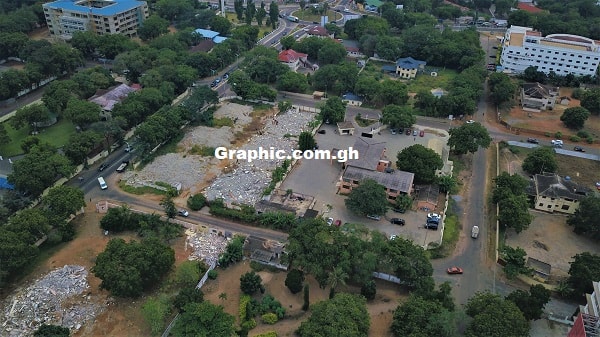
Supreme Court dismisses injunction application to halt construction of National Cathedral
The Supreme Court has dismissed an injunction application which sought to halt the construction of the National Cathedral.
A businessman, Johnathan Holm, filed the application for injunction with the aim to stop the construction of the national edifice until the final determination of his suit challenging the legality of the land being used for the construction.
Advertisement
It is the case of Mr Holm that it is unconstitutional for the government to use the land for the construction of a National Cathedral because the government compulsorily acquired the land for residential purposes for public officers.
However, in a unanimous decision yesterday, a seven-member panel of the Supreme Court dismissed the injunction application on the basis that the court could order remedies to cure any loss that might occur if the construction continued and the applicant was successful with his substantive case.
According to the court, per Article 2 Clause 2 of the 1992 Constitution, the apex court was clothed with the power to make such orders and declarations as it deemed appropriate.
The seven-member panel was presided over by the Chief Justice, Justice Anin Yeboah, with Justices Jones Dotse, Paul Baffoe-Bonnie, Sule Gbadegbe, Samuel K. Marful-Sau, Agnes Dordzie and Nene Amegatcher as the members.
Public interest and public purpose
Counsel for the applicant, Mr Bright Akwetey, in his submission implored the court to grant the injunction application.
He argued that the government had flagrantly violated the constitutional provisions on compulsory acquisition of land with the construction of the National Cathedral.
Counsel, therefore, urged the court to halt the construction of the National Cathedral which he described as a constitutional nullity.
According to him, per Article 20 Clause 5 of the 1992 Constitution, the government ought to use the land for the public purpose for which it compulsorily acquired it.
He added that since the government was no longer using the land for residential purposes, it ought to give the Osu Stool the first option of acquiring it back as stipulated in Article 20 Clause 6 of the 1992 Constitution.
At that point, Justice Amegatcher asked Mr Akwetey if he had read the whole of Article 20 Clauses 5 and 6 of the 1992 Constitution.
He told counsel that the two constitutional provisions stipulated that a land compulsorily acquired by the government must be used in the public interest or for the purpose for which it was acquired.
Justice Amegatcher then asked counsel if the construction of the National Cathedral did not fall under the public interest aspect as stated in Article 20 Clauses 5 and 6.
Mr Akwetey answered in the negative.
Article 20 Clause 5 of the 1992 Constitution stipulates that, “Any property compulsorily taken possession of or acquired in the public interest or for a public purpose shall be used only in the public interest or for the public purpose for which it was acquired.”
Clause 6 of Article 20 states that in the event the property is not used for the public interest or public purpose for which it was acquired, the owner of the property shall be given the first option of acquiring it.
Previous decision
Justice Gbadegbe also asked Mr Akwetey whether he had taken into consideration the Supreme Court’s decision in January last year which declared the construction of the National Cathedral as constitutional.
In the said decision, the apex court dismissed a suit by James Kwabena Bomfeh, a member of the Convention People’s Party (CPP), challenging the constitutionality of the state’s involvement in the construction of the National Cathedral.
According to Justices Gbadegbe and Dotse, since the apex court had already declared the construction of the National Cathedral as not breaching the 1992 Constitution, the applicant must convince the court in the instant case to depart from its previous decision.
In response, Mr Akwetey answered that the reliefs his client was seeking in the instant matter were totally different from the suit which led to the Supreme Court decision last year.
A-G’s response
In her response, Ms Dorothy Afriyie Ansah, a Chief State Attorney who represented the State, urged the court to dismiss the application for injunction.
It was her argument that the government had already signed a contract for the construction of the National Cathedral and putting an injunction on the construction would lead to financial loss to the state.
She contended that if the construction continued and the applicant was successful with his substantive case, he (applicant) could be adequately compensated.
“The land is already for the State; whether the suit is successful or not the land remains the property of the state. The state will suffer irreparable damage if this injunction is granted,” she added.
Substantive case
In 2018, Mr Holm invoked the original jurisdiction of the Supreme Court by challenging the government’s decision to give out land for the construction of a National Cathedral.
He is seeking a declaration that the land designated by the President of the Republic for the construction of the cathedral was compulsorily acquired under Section 3 of the Public Lands Ordinance of 1876 (Cap. 134) from the Osu Stool by virtue of a Certificate of Title dated November 29, 1910 for residential purposes for public officers and had been used for the public purpose for which it was acquired and, therefore, the user (government) cannot change to accommodate the national cathedral.
He further wants a declaration that if the land acquired under the Certificate of Title dated November 29, 1910 for residential purpose is no longer required for the purpose for which it was compulsorily acquired, the Lands Commission is enjoined by virtue of Article 20 (6) of the Constitution to grant the Osu Stool the first option to re-acquire the land.
Joined to the suit as defendants are the Attorney-General and the Lands Commission as an entity.



